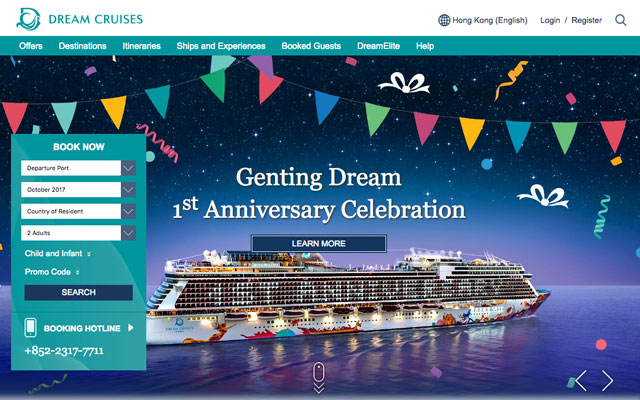The answer is no, at least not in the foreseeable future. Here’s why cruise is still seen as the domain of travel agents and one of the last bastions of commission income for them
Airlines and hotels have gone direct to consumers with much success. Not cruise lines, especially in Asia, despite key players such as Star Cruises, Dream Cruises and Royal Caribbean Cruises (RCC) having enabled customers to book directly through their websites all along. Princess Cruises was the latest, launching an online booking facility for South-east Asian customers in February, the first Princess office in Asia to do so.

According to Princess, various sources estimate online cruise bookings to be less than 10 per cent of the market globally, and the percentage is lower for longer sailings. Imagine how small it is then for Asia.
None of the players in Asia would say what their website versus agency booking market share is, although they alluded that the majority of bookings still are from travel agents and that the website is only helping to create a new market, particularly millennials, and does not replace traditional agencies.
All are afraid to offend agents.

Princess Cruises director South-east Asia, Farriek Tawfik, said: “I would like to reiterate that the launch of our online booking is not meant to take business away from agents but (is meant as) an additional option for guests seeking a simple, convenient and informative online experience.
“We want to offer our guests more booking options and provide them with more information. The site is like an educational tool helping guests, especially first-time cruisers, to familiarise themselves with our products. It’s also designed to engage Internet-savvy millennials, who are starting to choose cruises over other vacations and prefer to get their information online.
“We encourage guests who have complex itineraries, such as those requiring airline bookings, hotel accommodation and visa applications to go through travel agents. We also recommend first-time cruisers to go through agents so that they can have access to first-hand knowledge face-to-face or through the phone.”
Six months after it introduced the online booking facility, Princess said the response is in line with expectations. Repeat passengers and first-time cruisers who are Internet-savvy and English-fluent (the website is in English) are the most responsive, along with a “pleasant surprise” comprising veteran cruisers in their 70s, most likely because these passengers are well-versed with the cruise product. However, majority of traffic to the site use it more to find information such as location of cabins, facilities and activities, then follow-up with bookings either online or with travel agents.
“So, most of them use the site as a tool to get more information on the itineraries and pricing,” noted Farriek.
Unlike North America, the UK and Australia, where guests are used to booking cruises online, this is new to Asia, added Farriek. “We have found that Asian guests still prefer face to face or phone interaction with travel agents, especially as there is no surcharge for booking through agents,” he said.
Indeed, cruise is one of the last bastions of commission income for agents. Unlike an airline seat or a hotel room, cruise is more complicated, not to say confusing, to agents themselves, let alone consumers, who must trawl through various staterooms of an ocean liner, figure out what’s included/what’s not in the price, compare prices and facilities, check if visas are needed, and so on. It is, in one word, a value-added sell, where agents are still needed to remove the pain points for customers.

Said Sean Treacy, RCC managing director Asia-Pacific: “While we cannot reveal the percentage of direct vs agent bookings, what we can share is that the percentage of customers in South-east Asia booking through their local agents online is generally higher, due to the agents’ own market presence and the language factor, especially in the non-English speaking markets.”
Treacy believes there is room for both. As more customers, especially the millennials, prefer the online booking mode, and the market base and distribution network expand, both will grow in tandem.
“We are always reaching out to new customers through various marketing and social media campaigns. At the same time, in many of our advertisements in Singapore, for instance, we feature our top agents’ contacts, as part of our efforts to publicise our other distribution channels,” said Treacy.
Likewise, Princess aims to reach out to both consumers and agents. Said Farriek: “While many people are accustomed to relying on travel agents, we have seen a positive response and believe there is potential for growth as guests become confident about booking online through a simple and informative online experience.
“We are also increasing our collaboration with travel agents, especially in areas where they have a wide reach.”
The good news for travel agents is also the entry of cruise technology firms in Asia that promise to revolutionise the way they sell cruises, for example, giving them access to multiple global products on a single platform. One such company is UK-based Traveltek, which has opened a regional office in Hong Kong.
According to Simon Leung, business development manager North Asia, Traveltek, it’s the absence of such advanced specialist cruise technology that hampers the ability of the region’s travel agents to sell cruises effectively and efficiently (see box).
With better cruise technology, agents in Asia can ensure cruise commissions will remain a major revenue earner for a long time to come.




















